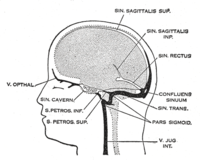
Photo from wikipedia
Sense of agency refers to the feeling of being in control of one’s actions. Previous research has demonstrated that sense of agency is produced through the sensorimotor system, which is… Click to show full abstract
Sense of agency refers to the feeling of being in control of one’s actions. Previous research has demonstrated that sense of agency is produced through the sensorimotor system, which is involved in comparing internal predictions with sensory feedback in motor control. Therefore, sensorimotor deficits might impair agency through a sensorimotor system malfunction. The present study examined this hypothesis by investigating post-stroke patients who had suffered a subcortical stroke that damaged regions associated with sensorimotor function. To examine agency judgments with respect to motor control, we adopted a self-other attribution task and applied it to post-stroke patients. Participants traced a horizontal straight line and received visual feedback through a cursor on a monitor. The cursor movement reflected either the participants’ actual movement or the movement of an “other” that had been previously recorded. Participants judged whether the cursor movement reflected their own movement (self) or an other’s movement while they engaged in four cycles of the horizontal tracing movement. After each trial, participants reported their self-other judgment on a nine-point scale. Post-stroke patients completed the experiment with their paretic as well as their non-paralyzed upper limbs. Compared to healthy controls, patients made significantly more self-attributions of others’ movements. Interestingly, such misattributions were observed in the patients’ performance using both paretic and non-paralyzed upper limbs. These results suggest that post-stroke patients with sensorimotor deficits form misattributions that cannot be explained solely by the sensorimotor system’s role in motor control. We discuss these misattributions in post-stroke patients in terms of cue integration theory.
Journal Title: PLoS ONE
Year Published: 2020
Link to full text (if available)
Share on Social Media: Sign Up to like & get
recommendations!